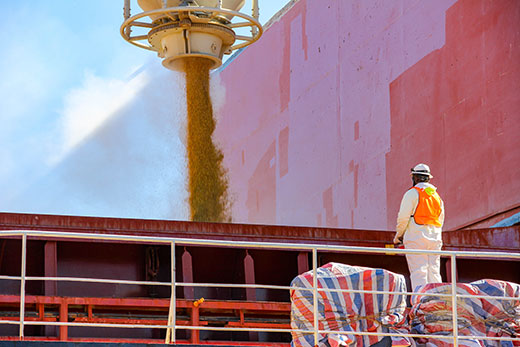
Grain is loaded to a vessel at a U.S. port (pictured). K-State researchers are studying processes proven to be effective at reducing the risk of foreign animal disease in feed and feed ingredients.
K-State studies methods to protect feed from foreign animal disease
Researchers to present findings at annual Swine Day, Nov. 16
Nov. 9, 2023
By Pat Melgares, K-State Research and Extension news service
MANHATTAN, Kan. – Kansas State University swine researchers are reporting positive results on three processes that aim to lessen the risk of a foreign animal disease entering the United States in plant-based feed or feed ingredients.
While the researchers acknowledge that foreign animal disease may be more likely to enter the country with the animals themselves, feed – including soybeans, corn and others – also raise concern in the livestock industry.
“African Swine Fever and Classic Swine Fever are devastating viral diseases affecting swine, and the risk of introducing these viruses through feed and feed ingredients is well documented,” said Jamil Faccin, a post-doctoral researcher in K-State’s Department of Animal Sciences and Industry.
Olivia Harrison, a K-State graduate research assistant in the Department of Animal Sciences and Industry, said previous research has shown that once contaminated feed enters a mill, the virus persists for multiple batches of feed, remains on equipment and can be found on non-feed contact surfaces throughout the mill.
Harrison and Chad Paulk, an associate professor of feed science and management, led a team that evaluated the effectiveness of three processes to clean a mill that is suspected of processing contaminated feed:
- Flushes, which include using batches of feed not intended for consumption, with or without liquid treatments.
- Pelleting feed with a conditioning temperature of 180 degrees Fahrenheit.
- Physical decontamination of equipment, including power washing and various disinfecting strategies.
“All strategies across these three studies were able to reduce the presence of the virus in the mill,” Harrison said, noting the level of success varied among the processes tested. But, she adds, “overall, these techniques, along with other biosecurity measures at mills, can reduce the risk of virus spread throughout the swine production system.”
Paulk called the decontamination techniques “practical” ideas for mill operators in the case that contaminated feed reaches their business.
“If contaminated with a swine virus, feed mills would act as an epicenter between swine farms and ingredient suppliers,” Paulk said. “Mitigation techniques need to be evaluated to decrease or eliminate these viruses from mills as soon as possible, to reduce the possible spread of disease.”
Harrison said K-State’s research was conducted as part of a national feed biosafety working group within the U.S. Swine Health Improvement Plan, known as US SHIP. She said the national work is helping to establish better processes for traceability, biosecurity and disease surveillance in feed and feed ingredients imported to the United States.
U.S. farmers and ranchers can voluntarily participate in US SHIP. As of mid-2023, more than two-thirds already have certified their operations under the program, according to the USDA Veterinary Service.
More information on K-State’s research on feed mitigation strategies and efforts to reduce the risk of foreign animal disease in livestock will be presented during the university’s annual Swine Day, which will take place on Nov. 16 in Manhattan.
Registration is available online at asi.ksu.edu/swineday. More information also is available by contacting Katie Smith at 785-532-1267 or katiesmith@ksu.edu.

